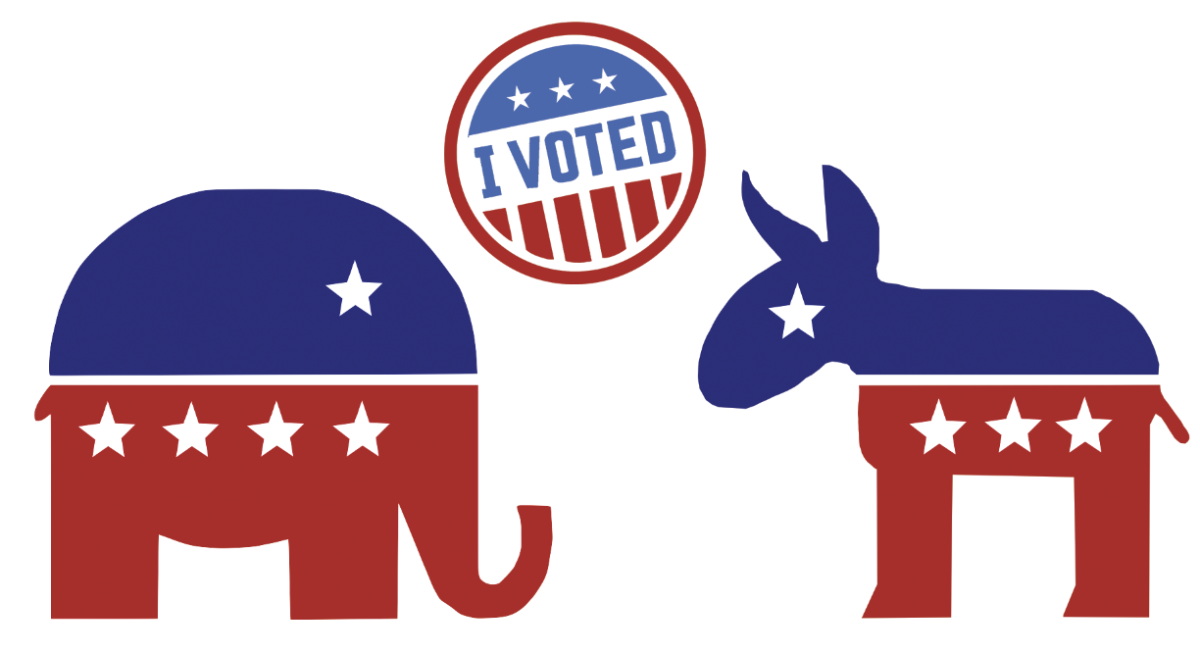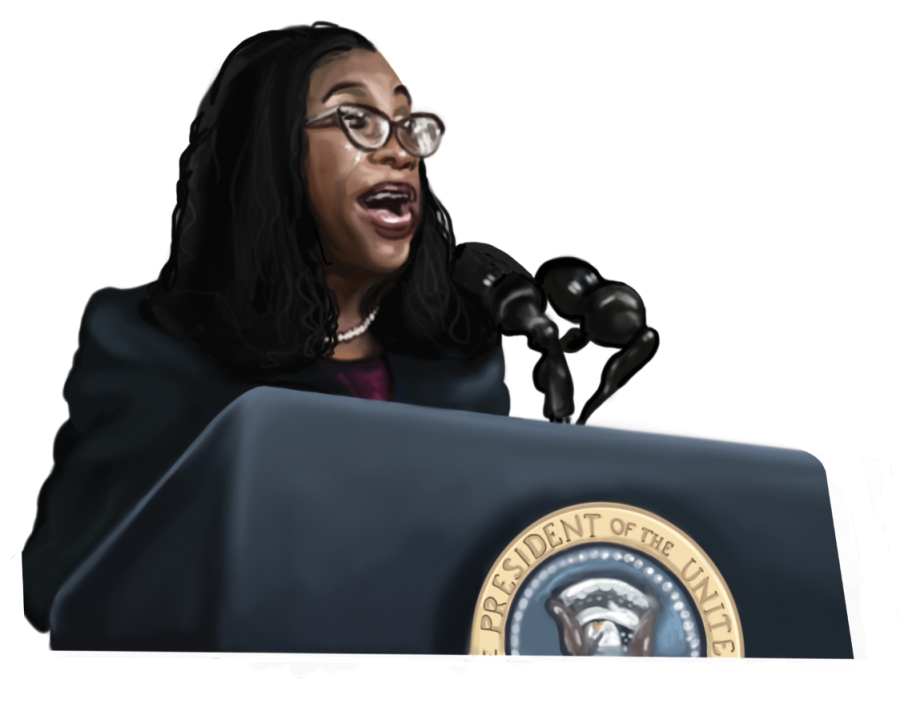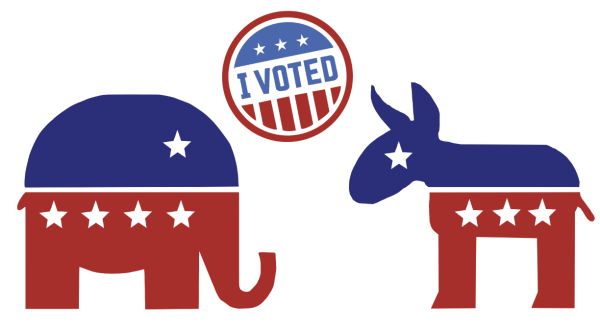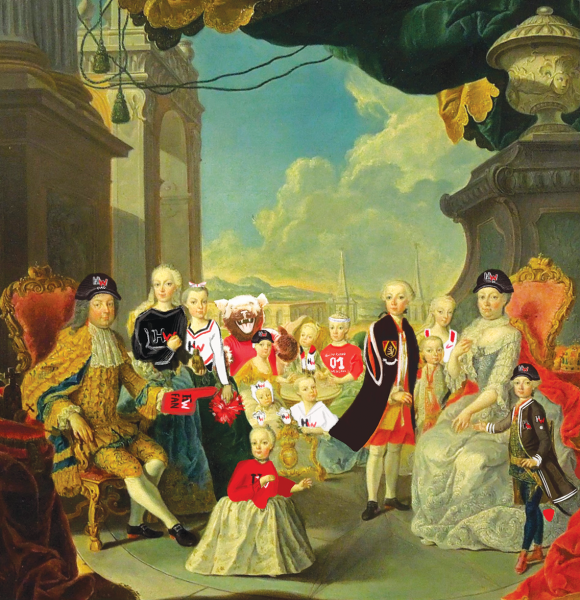Doing The Court Justice
Members of the school community reflect on the significance of Judge Ketanji Brown Jackson’s nomination to the Supreme Court.
Illustration by Alexa Druyanoff
Judge Ketanji Brown Jackson addresses reporters at the White House after President Biden’s announcement that he will appoint her to the Supreme Court.
Following several losses in a primary battle with progressive Senator Bernie Sanders, and with the critical South Carolina primary looming, then-Presidential candidate Joe Biden pledged to nominate a Black woman to the U.S. Supreme Court in February 2020. Two years later, President Biden fulfilled his campaign promise by appointing Judge Ketanji Brown Jackson to succeed retiring Justice Stephen Breyer on Feb. 25.
Jackson graduated from Harvard Law School in 1996 and served as a supervising editor of the Harvard Law Review before clerking for Breyer from 1999 to 2000. Prior to her historic nomination, Jackson served as a district judge for the U.S. District Court for the District of Columbia (D.C.) from 2013 to 2021. After President Biden took office, he nominated Jackson to the U.S. Court of Appeals for the D.C. Circuit—the second-highest court in the country—on which she has served for nearly a year.
Jackson’s confirmation hearings before the Senate Judiciary Committee began March 21, and if confirmed, she will make history by becoming the first Black woman to sit on the nation’s highest court.
Black Leadership Awareness and Culture Club (BLACC) member Idalis McZeal ’23 said she is pleased about Jackson’s nomination and hopes the milestone will be a catalyst for greater diversity in government institutions.
“I think it’s really exciting that [Jackson], who is part of an underrepresented minority group in America, has been nominated for such a powerful position,” McZeal said. “Hopefully, this is just the beginning, and we’ll see more representation for marginalized groups who have been excluded for so long [from government positions].”
McZeal, who identifies as Black, said she feels a strong connection to Jackson and encouragement in knowing that someone who comes from a similar ethnic background as hers has received such recognition.
“Seeing people like me in such high positions of power inspires me to reach higher,” McZeal said. “[Jackson] is a role model not only for me but for young Black women everywhere who can now finally see someone who looks like us in prominent roles in our country. Her nomination gives me hope for my own future.”
Conservative pundits and politicians have suggested that by pledging to nominate a Black woman, President Biden would not choose someone with the necessary qualifications, according to CNN Politics. Fox News host Tucker Carlson, for example, called on President Biden to release Jackson’s Law School Admission Test (LSAT) score as a metric for her legal talent. McZeal said comments like Carlson’s reflect a longstanding pushback toward the advancement and successes of people of color.
“For example, people tried to claim President [Barack Obama] wasn’t born in America,” McZeal said. “People are so resistant to change and will find any excuse to delegitimize a person’s achievements, especially the successes of people of color. I think this is typical in American society, where we see people not wanting a Black woman to serve on the Supreme Court. Her credentials prove that she is clearly highly qualified for the position.”
Alex Lee ’24 said he noticed Jackson being confronted by political commentators but that the controversy has led to important discussions about race and gender, issues that he said need attention for the country to progress.
“Trump’s nominees to the court were treated very differently from the way Jackson is being treated by the media,” Lee said. “The attacks were never made on their race because frankly, they were all white. Although Jackson is being treated unfairly, her nomination has initiated meaningful and necessary conversations that have to happen if we’re ever to achieve social, legal and racial justice and equality in our country.”
Lee said he hopes to pursue a legal career and feels inspired by President Biden’s choice to appoint a Black woman to the Supreme because it reassures him that the nation is making strides in diversity and equity.
“Jackson’s nomination is crucial not only for the Black community but also for other minorities who haven’t had representation in the highest court of the land,” Lee said. “For instance, there hasn’t been a Supreme Court justice who’s Asian. Jackson’s nomination gives me hope that I can succeed if I choose to go into law and that, as a nation, we will have an increasingly diverse and inclusive judicial system.”
Empower Club Co-leader Shoshie Bernstein ’22 said because women of color are often the last to be included in major governmental roles, Biden’s nomination of Jackson is particularly important.
“I feel [that] the first woman to [achieve milestones] in government is usually a white woman,” Bernstein said. “But I think this just shows that we’re working past that. I think it is so important that we are starting not just to have white women [in government], but also to have women of different races and backgrounds.”
Three of the nine sitting Supreme Court justices are women. Bernstein said the late Justice Ruth Bader Ginsburg inspires her as a Jewish woman.
“I’m a huge [Ginsburg] fan,” Bernstein said. “I always think back to when she was asked, ‘When do you think there will be enough women on the Supreme Court?’ And she said, ‘When there are nine.’ I very much align with that belief.”
Jackson’s nomination comes after the appointment of Amy Coney Barrett to the Supreme Court by President Donald Trump in 2020. When Barrett, who was nominated by a Republican president, replaced Ginsburg, the nominee of a Democratic president, the ideological balance of the court shifted to two-thirds conservative, according to the Washington Post.
The recent conservative dominance of the Supreme Court has signaled to many that the court is now primed to overturn landmark cases like Roe v. Wade, which guaranteed abortion rights nationwide, and Obergefell v. Hodges, which legalized same-sex marriage, according to PBS.
Jackson’s appointment would not shift the court ideologically, as she is replacing Breyer, and both Breyer and Jackson are widely considered liberals, according to CNN Politics. In turn, Bernstein said since abortion rights are an issue of particular importance to her, Jackson’s nomination illustrates how difficult it is to change the impact of the Supreme Court.
“The one issue that I have on my mind, that I feel like everyone has on their mind, is the [Dobbs v. Jackson Women’s Health Organization] abortion case, and how it’s very likely that Roe v. Wade is going to be overturned in a few months,” Bernstein said. “And unfortunately, just because of how the Supreme Court works, having one justice who would have probably voted to protect Roe v. Wade be replaced by another justice who is going to vote presumably to protect Roe v. Wade means that won’t really have an impact on what the result will be.”
Upper School History Teacher Peter Sheehy said he is deeply concerned about the potential overturning of Roe v. Wade. While discussing the history of women’s rights with students in his Advanced Placement (AP) U.S. History class, Sheehy said he noticed setbacks as attempts have been made to criminalize women who want to fulfill their legal right to an abortion.
“In class, we were just talking about the efforts to pass the 19th Amendment and struggling to figure out why there was so much resistance to it,” Sheehy said. “Then we discussed the Equal Rights Amendment, which was on the verge of passing but is now politically dead. Although there has been so much progress since the ’80s, we’re now seeing an assault on women’s reproductive freedom, like the [Texas Heartbeat Act], which empowers private citizens to go after and sue abortion providers, as well as people who in any way assist with a woman getting an abortion, which is still legal under [Roe v. Wade].[The bill’s] assault on that landmark decision is troubling to me.”
Despite the fact that Jackson’s presence on the court will most likely not shift the current conservative majority, Raisa Effress ’23 said the significance of Jackson joining the court cannot be overstated, as it signals a change in leadership for decades to come.
“Even though the nomination of [Jackson] to an existing liberal seat won’t sway the underlying partisanship of the court, it’s at the very least comforting to know that the U.S. is installing a new generation of progressive justices especially now with important issues like abortion rights being debated before the court,” Effress said.
Lee said he recognizes that Jackson’s appointment will probably not lead to changes in the decisions made by the court. However, Lee said Jackson may provide a fresh perspective that will have a positive impact not only on the Supreme Court’s opinions but also on the lower courts that constitute the American justice system.
“The greater racial representation on the court may not change policies immediately, but it will provide a more diverse perspective and a way of framing policies that will trickle down into other parts of the nation like lower courts and district circuits that rely on the information and precedents set by the Supreme Court to make their decisions,” Lee said. “I think having Justice Jackson on the court will lead to change for the better.”
Claire McLean ’23 said Jackson’s past experience as a public defender will also bring a critical voice to the court.
“[Jackson] is the first public defender to be nominated [to the Supreme Court],” McLean said. “Her background in criminal defense will definitely add a unique perspective to the court.”
Jackson’s Senate hearings began March, which was designated by Congress as Women’s History Month in 1987. Bernstein said this coincidence serves as a poignant reminder of how the nation is slowly working its way toward gender equality.
“During Women’s History Month, I think [specifically] of the strides that women make,” Bernstein said. “Having this historic appointment kind of reminds me of how important it is to still make strides and how many strides are left to be made, because while it’s so exciting that we have a Black woman on Supreme Court, we still have never had a female president. Basically all bodies of government in the U.S. are disproportionately male. I think it is exciting but also really motivating to keep pushing for more equality.”













































